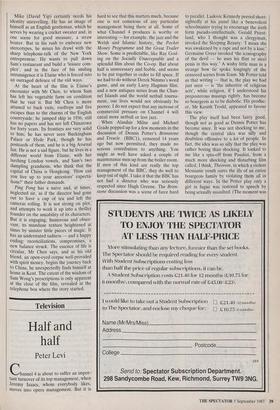Television
Half and half
Peter Levi
Channel 4 is about to suffer an impor- tant turnover of its top management, when Jeremy Isaacs, whom everybody likes, moves into opera management. But it is
hard to see that this matters much, because one is not conscious of any particular management being there at all. Some of what Channel 4 produces is worthy or interesting — for example, the jazz and the Welsh and Islamic history, the Pocket Money Programme and the Great Trailer Show. Some is predictable, like Ray Gosl- ing on the Socially Unacceptable and a splendid film about the Co-op. But about half is unnecessary and feeble, and seems to be put together in order to fill space. If we had to do without Derek Nimmo's word game, and an early Larry Hagman film, and a new antiques series from the Chan- nel Islands and the world netball tourna- ment, our lives would not obviously be poorer. I do not expect that any increase of commercial pressure on Channel 4 will entail more netball or less jazz.
When Alasdair Milne and Michael Grade popped up for a few moments in the discussion of Dennis Potter's Brimstone and Treacle (BBC1), censored 14 years ago but now permitted, they made no serious contribution to anything. You might as well have asked a couple of maintenance men up from the boiler room. If men of this kind are really the top management of the BBC, they do well to keep out of sight. I take it that the BBC has not had a director who was seriously respected since Hugh Greene. The Brim- stone discussion was a scene of farce hard
to parallel. Ludovic Kennedy peered short- sightedly at his panel like a benevolent schoolmaster trying to encourage the sixth form pseudo-intellectuals. Gerald Priest- land, who I thought was a clergyman, invoked the Sleeping Beauty: 'I mean she was awakened by a rape and not by a kiss.' Germaine Greer invoked 'the iconography of the devil — he uses his flint or steel penis in this way.' A wishy little man in a strange bow tie spoke longingly of the censored scenes from Scum. Mr Potter told us that writing — that is, the play we had just seen — is 'the inheritor of religious acts', while religion, if I understood his preposterous musings rightly, has become so bourgeois as to be diabolic. His produc- er, Mr Kenith Trodd, appeared to favour this view.
The play itself had been fairly good, though not as good as Dennis Potter has become since. It was not shocking to me, though the central idea was silly and doubtless offensive to a lot of people. In fact, the idea was so silly that the play was rather boring than shocking. It looked to me like a spin-off from Pasolini, from a much more shocking and disturbing film called, I think, Theorem, in which a violent Messianic youth cures the ills of an entire bourgeois family by violating them all in different ways. In the Potter play only a girl in fugue was restored to speech by being sexually assaulted. (The moment was not shown so I am not clear how far he went.) The play had its longueurs; it was better than the world netball, but not worth such a fuss. Still, the discussion was so daft that it cheered me up for days. One likes to know that such people still exist. Germaine Greer said of the girl in fugue, `The keyboard is bust but the software is intact.' That is the sort of phrasing that would impress the mandarins: it has what they call relevance and cutting-edge.
BBC2 showed the Iperess File for about the ninetieth time, for no apparent reason, but as I can never quite remember the plot I always find it agreeable, except for the ridiculous torture scene. One had to miss much of it in order to see Brimstone and Treacle, unless one manipulated the video. But the greatest pleasure of that particular evening came very late indeed. It was Albert Ayler, a jazz saxophone player, in Sounds of Surprise (Channel 4), the last in a thrilling series. This was another overlap, but I was lucky to catch the end of it, fiddling about with the television set too tired to go to bed. This business of overlap- ping has some advantages. Catching up on Coronation Street (ITV), which I enjoy less and less, was a good excuse to avoid Open Space (BBC2) about an old English fascist body-builder with a stroke.
There is one star in the sky: BBC2 is now making a new series of Yes, Prime Minis- ter.



















































 Previous page
Previous page